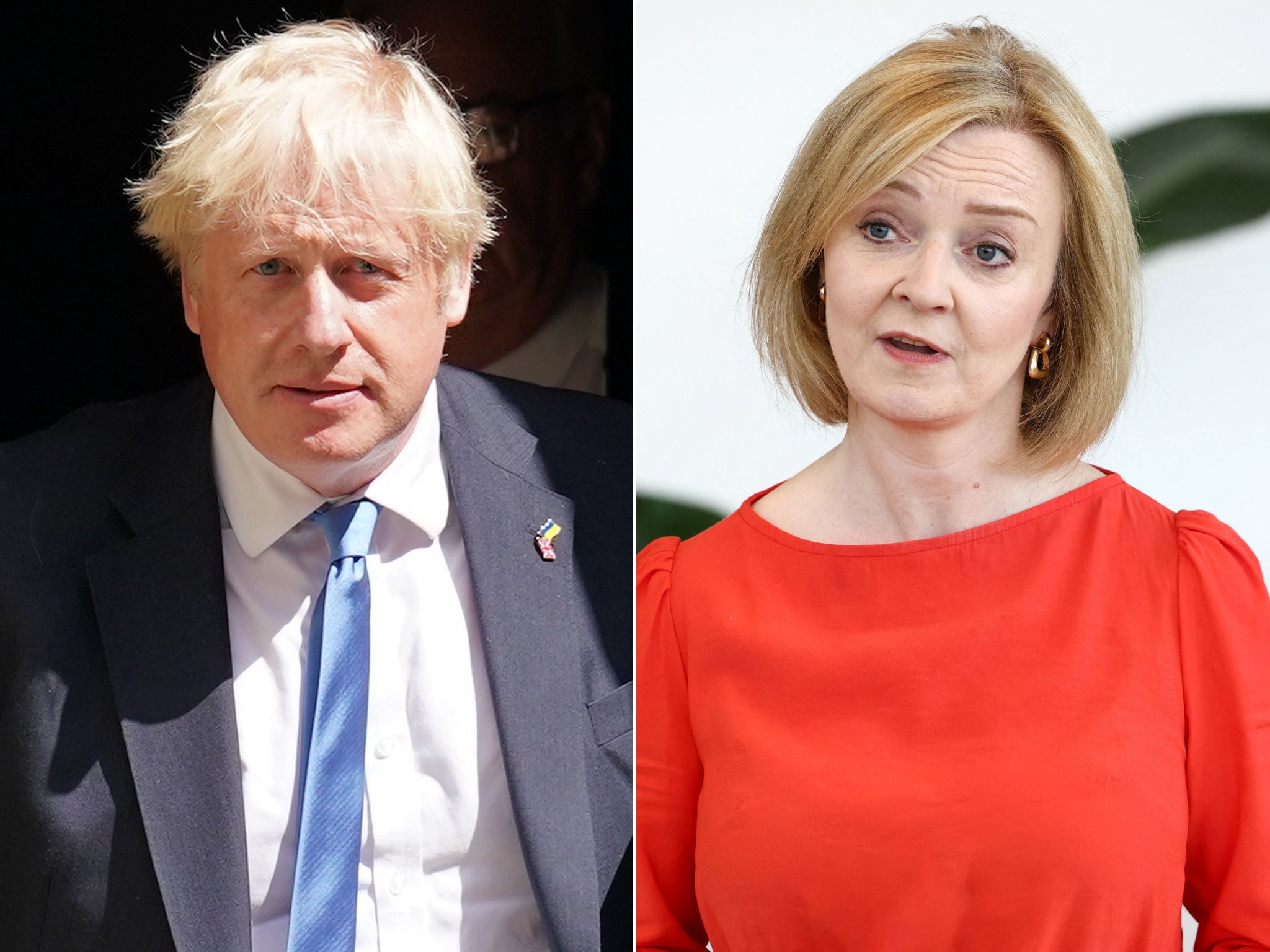The cult of Boris Johnson spells trouble for Liz Truss
Conservative Party members are not reconciled to the prime minister’s departure, writes John Rentoul


On the day before and the day of Boris Johnson’s announcement that he would stand down as prime minister, YouGov asked Conservative Party members whether he should or should not resign: most of them, 59 per cent, said he should.
Four weeks later, YouGov asked a similar sample of Tory members: “Thinking back to the start of July, do you think Conservative ministers and MPs were right or wrong to effectively force Boris Johnson to resign?” Most of them, 53 per cent, said they were wrong.
You can see how Conservatives might rationalise these answers. As Luke Tryl of the More In Common campaign said, it “seems inconsistent, but this is entirely in line with the focus group of party members we carried out. They all thought, reluctantly, that Boris had to go, but then also held the fact that Sunak played a leading part in his downfall against him as they felt it disloyal.”
But it seems inconsistent because it is inconsistent. If they thought Johnson should resign, that cannot have been just because Sunak and others had made his position impossible. If Tory MPs were wrong to try to get rid of him, then he should have stayed. He should have challenged his critics to get rid of him by changing the rules to allow another vote of confidence.
Which they would have done, and Johnson would have lost the vote. He knew that, which is why he announced his resignation. But the reason he would have lost was that he had made it impossible for Tory MPs to support him. He had embarrassed them once too often by saying things that were untrue and expecting them to cover up for him. He was not betrayed by Tory ministers and MPs; he betrayed them. He alone was responsible for his downfall.
It may seem surprising that the Chris Pincher episode should have been enough to bring down a prime minister. This is not to minimise the seriousness of sexual harassment – that was not the issue that broke Johnson. What did for him was that he claimed not to remember that he had been warned about Pincher’s conduct. This is the kind of convenient amnesia that many politicians deploy, but Johnson deployed it too often, and too unconvincingly.
It set off an eruption that had been waiting to happen. Public opinion had turned against Johnson over lockdown parties, mainly because of the hypocrisy of a government breaking its own laws, but made worse by Johnson’s apparent unwillingness to tell the truth about it.
The other reason why the end, when it came, was so sudden, was that Johnson had few reserves of loyalty among Tory MPs. The parliamentary party turned to him in desperation rather than conviction in 2019, and he did little to cultivate his supporters. When he tried to show loyalty to his allies when they were in trouble, such as Dominic Cummings and Owen Paterson, it went horribly wrong and ended up with everyone hating him.
So there is a grain of truth in the myth of “Boris betrayed”, which is that Tory ministers and MPs gave up on him sooner than they might have done, and sooner than seemed likely after he won a large parliamentary majority for them.
But what is surprising is the speed with which Johnson has already become – before he has even left Downing Street – the hero wronged. In one imperfectly worded question, YouGov even found that more Tory members think he would “make the best prime minister” (40 per cent) than either Liz Truss (28 per cent) or Sunak (23 per cent). That is still a minority among members, and it may be that a straight choice between him and Truss would produce a majority for her, but it is a large minority and it is not going to fade away quietly.
To keep up to speed with all the latest opinions and comment sign up to our free weekly Voices Dispatches newsletter by clicking here
The Conservative Party was scarred by the myth of “Margaret betrayed”, which helped contribute to 13 years of Labour government. It was much the same story. She was the author of her own downfall, by refusing to abandon the poll tax, which Tory MPs rightly thought would guarantee defeat at the next election. So they got rid of her by a democratic vote – in which she actually won the support of a majority of MPs, 55 per cent, but it wasn’t enough under the rules, so the outcome was similar to Johnson’s, in which he survived a vote of confidence but not by enough to fend off the next wave.
However much Truss may be favoured by Johnson and his supporters, she will be unable to satisfy his or their hunger for the impossible if she becomes prime minister. She will be accused of betraying him, his legacy, Brexit or all three by the time she gets back from the palace.
She will be accused of appointing traitors to her cabinet and her time in No 10 will be clouded by Johnson claiming he would have done this and he wouldn’t have done that. The large minority of party members who subscribe to the cult of Boris will say that she is doing it wrong and that if the party had stuck with him it wouldn’t be heading for election defeat at the hands of Keir Starmer and the Labour Party.
Who knows how long it will take the Conservatives to recover from the myth-making this time?






Join our commenting forum
Join thought-provoking conversations, follow other Independent readers and see their replies
Comments